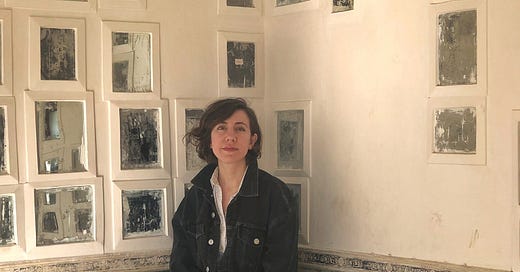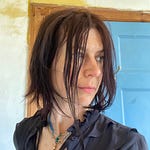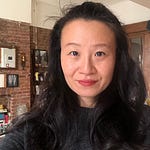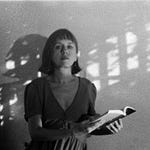Today’s recording is of Turkish poet and anthropologist e. irem az reading her multi-section prose poem “The Blond Daisy,” about irem’s late grandmother, Zinet Tosun, and her Allah: an Allah both universally boundless and simultaneously present in diurnal labor, from the very belief in a future to the flexion of present-tense tendons tasked with the preparation of “dizzying” pastries. Present, too, in the “creative-decaying” forces linking generations, including a grandmother in Çanakkale and her daisychild in New York City.
We will be publishing “The Blond Daisy” in Bored Wolves Spare Cots, an evolving journal project slated for autumn, about which I will have much more to share over the coming months.
A note on the use of “O” in the poem, which irem, who has been published in Turkish (see, Sade Yaşadığımız [Our Sheer Living], Nod, 2020), intuitively decided to write in English, comes in the form of a hypnotic author’s footnote to be included under the text:
“O is the only third person singular pronoun in Turkish. O is genderless, and is the only third person singular pronoun for all human and nonhuman, living and nonliving entities.”
×
“The Blond Daisy” epitomizes my belief in the inverse ability of “short” literary works to unforgettably enter the mind of the reader and, unlike longer forms, which have a habit of dissolving from memory (at least my Swiss-cheese memory; what the heck is the name of the main protagonist of my favorite novel again?), take root in a way that keeps them perpetually present in the mind. They can be so tenaciously, generously relevant beyond their initial reading and between subsequent re-readings, to which they lend themselves.
And so when irem writes, “theirs are not full stories. theirs are parts aware of their part-ness,” I have faith in the capacious wholeness of that intimately observed part-ness.
I am also grateful for the ways in which, even as publisher, I do not understand every moment or passage of “The Blond Daisy,” not because it is deliberately obtuse but rather because the poet has entrusted us with a multifaceted autobiographical puzzle, accessibly intricate, with shifting pathways into complex vulnerabilities. This is a sharing; it isn’t an easy one. But then there is an egg in my palm, an O with ponderable weight.










